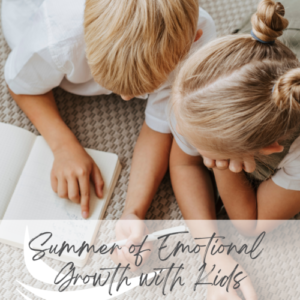 Summer offers new opportunities of growth for children, especially in the area of social and emotional development which is one of the four main areas of development (the other three include motor/ physical development, cognitive development, and communication/ language). While summer typically offers a more relaxed, unstructured environment for school-aged children, social-emotional-learning (SEL) continues throughout the summer.
Summer offers new opportunities of growth for children, especially in the area of social and emotional development which is one of the four main areas of development (the other three include motor/ physical development, cognitive development, and communication/ language). While summer typically offers a more relaxed, unstructured environment for school-aged children, social-emotional-learning (SEL) continues throughout the summer.
Social-emotional learning is defined as “the process of learning social and emotional skills”. These skills are viewed as just as important as academic skills and are an important foundation to academic success. What-does-the-research-say? SEL also supports positive attitudes about oneself, school and civic engagement, improves prosocial behavior, reduces conduct problems, and helps reduce emotional distress.
Did you know that CARE Counseling has many therapists who specialize in working with children and can incorporate fun activities to support social and emotional learning? Parents, caregivers, role models, educators, community supports, and professional helpers each have a role in supporting the social-emotional development of young people.
Main Components of Social-Emotional Learning (SEL) and Ways to Support Growth:
Help Children Work with their Own Emotions
Children are learning a lot about emotions and emotional regulation. It is important to have good early role models who can help children learn to identify and name their emotions. Adults can-help-kids with-self-regulation strategies to regulate their emotions in healthy ways while setting boundaries for positive behavior. For example, it is OK to be mad, but it not OK to hurt someone [can specify example: hit, bite, etc.] when mad. Therapists are specifically trained to help with emotional identification, expression, and modulation and can work with children and their families.
Increase Awareness of Others’ Emotions
As children are increasing awareness of their own emotions, they are also learning about others. Being able to identify the emotions that others may be feeling in a situation, as well as what they may be thinking, can help cultivate-empathy. Children can be taught strategies to help pick up on other “cues” based on body language and emotional expression and to act in ways that are loving, kind, and compassionate.
Make (and Keep) Healthy Friendships
Social-skills are a foundation to building and maintaining healthy relationships. Summer tends to offer some great structured and unstructured group activities to interact with other children—from family gatherings, summer vacations, summer school, or summer camp… now is a great time to take advantage of these opportunities while making new friends and maintaining old friendships.
Use Effective Problem-Solving and Communication Skills
Children are learning a lot about how to solve problems. Learning some basic (yet effective) assertive communication and problem-solving skills can help children and teens as they interact with others in a variety of situations and demonstrate prosocial-behavior.
Make Responsible Decisions
Summer is the perfect time to demonstrate responsibility in fun ways through play while also incorporating self-control-for-kids. Enriching summer activities may assign children various leadership roles that help foster responsible decision-making. In addition. parents and caregivers have opportunities to support children in making decisions that align with their values such as choice in what activities to do over the summer or how money earned with a summer job is spent.
Written By: Charlotte Johnson, MA, LPCC
We’re Here to help
Our wellness experts will be happy to take care of you. You can CLICK HERE to schedule an appointment now or call (612)223-8898.
Meet Clinicians
We’re united by our commitment to providing effective, relevant, and innovative mental health support at all stages of your journey. Click Here to find out more about who we are, where we come from, and how we live out CARE’s mission every day.
The professionals at CARE are actively collecting and creating resources to help with what you need. We’re Here for You.



